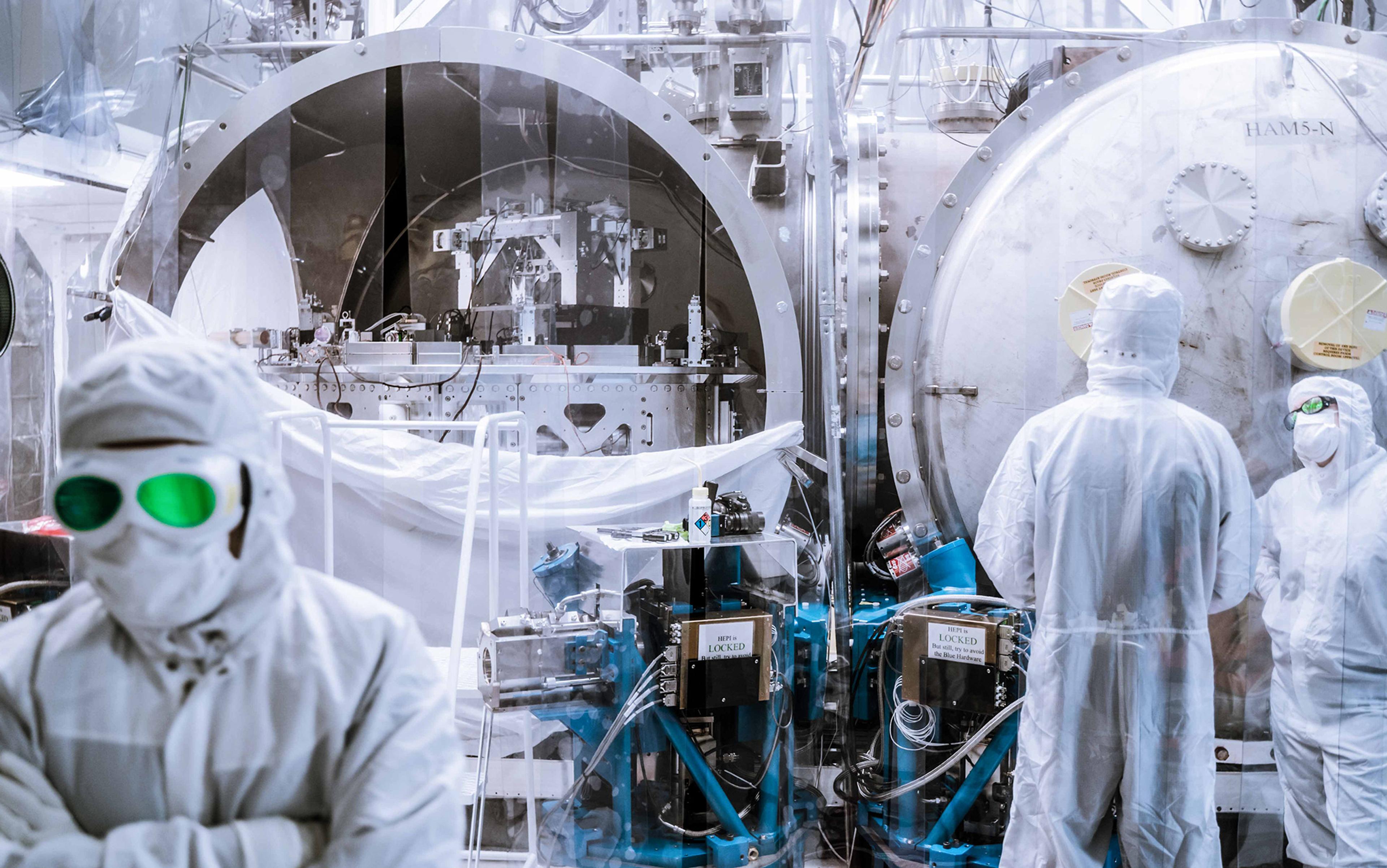If you ask philosophically minded researchers – in the Anglophone world at least – why it is that science works, they will almost always point to the philosopher Karl Popper (1902-94) for vindication. Science, they explain, doesn’t presume to provide the final answer to any question, but contents itself with trying to disprove things. Science, so the Popperians claim, is an implacable machine for destroying falsehoods.
Popper spent his youth in Vienna, among the liberal intelligentsia. His father was a lawyer and bibliophile, and an intimate of Sigmund Freud’s sister Rosa Graf. Popper’s early vocations draw him to music, cabinet making and educational philosophy, but he earned his doctorate in psychology from the University of Vienna in 1928. Realising that an academic post abroad offered escape from an increasingly antisemitic Austria (Popper’s grandparents were all Jewish, though he himself had been baptised into Lutheranism), he scrambled to write his first book. This was published as Logik der Forschung (1935), or The Logic of Scientific Discovery, and in it he put forward his method of falsification. The process of science, wrote Popper, was to conjecture a hypothesis and then attempt to falsify it. You must set up an experiment to try to prove your hypothesis wrong. If it is disproved, you must renounce it. Herein, said Popper, lies the great distinction between science and pseudoscience: the latter will try to protect itself from disproof by massaging its theory. But in science it is all or nothing, do or die.
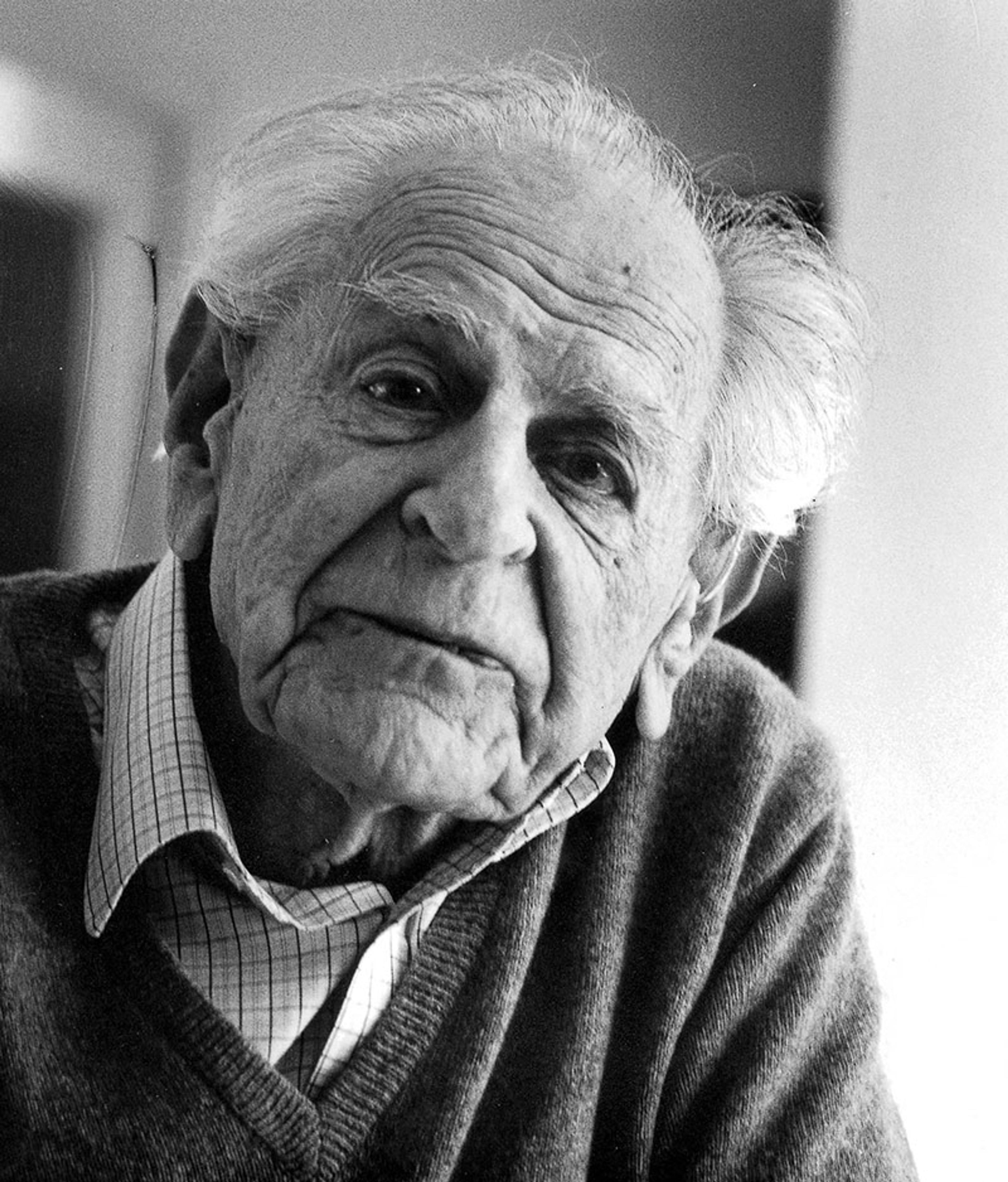
Karl Popper, 1987. Photo by Süddeutsche Zeitung/Alamy
Popper warned scientists that, while experimental testing might get you nearer and nearer to the truth of your hypothesis via corroboration, you cannot and must not ever proclaim yourself correct. The logic of induction means that you’ll never collect the infinite mass of evidence necessary to be certain in all possible cases, so it’s better to consider the body of scientific knowledge not so much true as not-yet-disproved, or provisionally true. With his book in hand, Popper obtained a university position in New Zealand. From afar, he watched the fall of Austria to Nazism, and commenced work on a more political book, The Open Society and its Enemies (1945). Shortly after the war, he moved to the UK, where he remained for the rest of his life.
For all its appealing simplicity, falsification was quickly demolished by philosophers, who showed that it was an untenable way of looking at science. In any real experimental set-up, they pointed out, it’s impossible to isolate a single hypothetical element for disproof. Yet for decades, Popperianism has nonetheless remained popular among scientists themselves, in spite of its potentially harmful side-effects. Why should this be?
It was a group of biologists that gave Popper his first scientific hearing. They met as the Theoretical Biology Club in the 1930s and ’40s, at the University of Oxford, at house parties in Surrey, and latterly in London too. Popper visited them both before and after the war, as they wrestled with evolutionary theory and with establishing connections between their different biological specialisms. During the prewar period in particular, evolutionary biology was – depending on one’s outlook – either excitingly complex or confusingly jumbled. Neat theories of Mendelian evolution, where discrete characteristics were inherited on the toss of a chromosomal coin, competed to explain evolution with arcane statistical descriptions of genetic qualities, continuously graded across populations. Meanwhile the club’s leading light, Joseph Henry Woodger, hoped for a philosophically tight way of clarifying the notoriously flaky biological concept of ‘organicism’. Perhaps Popper’s clarifying rigour could help to sort it all out.
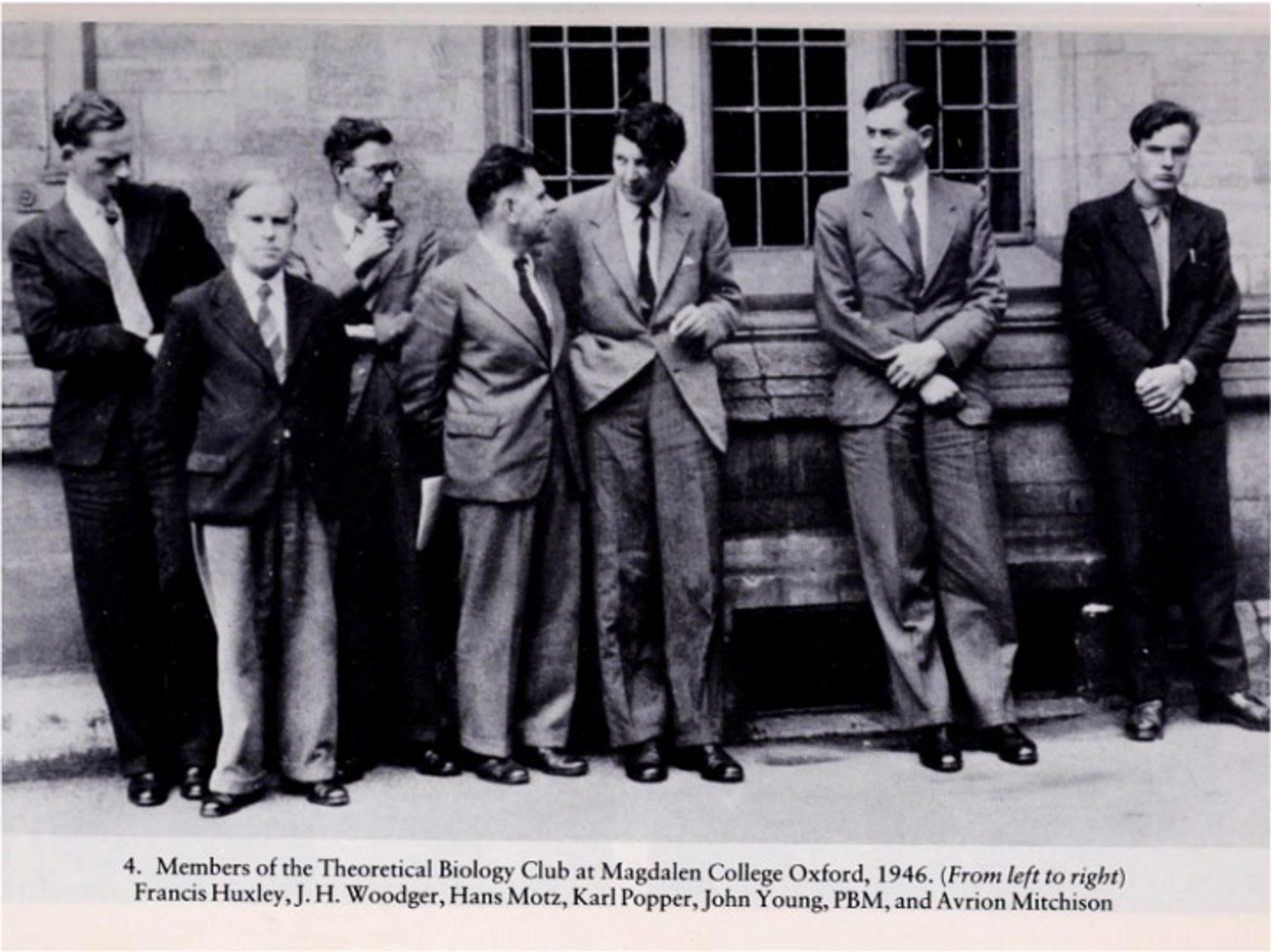
Photo supplied by the author
It is a striking fact that Popper’s most vocal fans came from the biological and field sciences: John Eccles, the Australian neurophysiologist; Clarence Palmer, the New Zealand meteorologist; Geoffrey Leeper, an Australian soil scientist. Even Hermann Bondi, an Austrian-British physical scientist, who operated at the speculative end of cosmology. In other words, it was the scientists whose work could least easily be potted in an attempted laboratory disproof – Popper’s method – who turned to Popper for vindication. This is odd. Presumably, they hoped for some epistemological heft for their work. To take a wider angle on the mystery, we might note the ‘physics envy’ sometimes attributed to 20th-century field scientists: the comparative lack of respect they experienced in both scientific and public circles. Popper seemed to offer salvation to this particular ill.
We don’t conclude we’ve disproved well-established laws of physics – rather, that our experiment was faulty
Among the eager philosophical scientists of the Theoretical Biology Club was a young man named Peter Medawar. Shortly after the Second World War, Medawar was drafted into a lab researching tissue transplantation, where he began a Nobel-winning career in the biological sciences. In his several books for popular audiences, and in his BBC Reith lectures of 1959, he consistently credited Popper for the success of science, becoming the most prominent Popperian of all. (In turn, Richard Dawkins credited Medawar as ‘chief spokesman for “The Scientist” in the modern world’, and has spoken positively of falsifiability.) In Medawar’s radio lectures, Popper’s trademark ‘commonsense’ philosophy was very much on display, and he explained with great clarity how even hypotheses about the genetic future of mankind could be tested experimentally along Popperian lines. In 1976, Medawar secured Popper his most prestigious recognition yet: a fellowship, rare among non-scientists, at the scientific Royal Society of London.
While all this was going on, three philosophers were pulling the rug away beneath the Popperians’ feet. They argued that, when an experiment fails to prove a hypothesis, any element of the physical or theoretical set-up could be to blame. Nor can any single disproof ever count against a theory, since we can always put in a good-faith auxiliary hypothesis to protect it: perhaps the lab mice weren’t sufficiently inbred to produce genetic consistency; perhaps the chemical reaction occurs only in the presence of a particular catalyst. Moreover, we have to protect some theories for the sake of getting on at all. Generally, we don’t conclude that we have disproved well-established laws of physics – rather, that our experiment was faulty. And yet the Popperians were undaunted. What did they see in him?
The historian Neil Calver argued in 2013 that members of the Royal Society were swayed less by Popper’s epistemological rules for research than by his philosophical chic. During the 1960s, they had been pummelled by the ‘two cultures’ debate that cast them as jumped-up technicians in comparison with the esteemed makers of high culture. Philosophy was a good cultural weapon with which to respond, since it demonstrated affinity with the arts. In particular, Popper’s account of what came before falsification in research was a good defence of the ‘cultural’ qualities of science. He described this stage as ‘conjecture’, an act of imagination. Medawar and others made great play of this scientific creativity in order to sustain cultural kudos for their field. Their Popper was not the Popper of falsification at all, but another Popper of wishful interpretation.
Although important to its participants, the two cultures debate was a storm in an institutional teacup. During the 1950s and ’60s, when Popper’s Logik der Forschung was available in English (The Logic of Scientific Discovery, 1959), clouds were gathering that threatened to flood out more than the chinaware of the Royal Society. In the public mind, the scientist was becoming a dangerous figure, the bogeyman responsible for the atomic bomb. Stanley Kubrick’s Dr Strangelove (1964), played in so memorably deranged a fashion by Peter Sellers, was the embodiment of the type. Strangelove struck at the heart of Popperian ideals, an unreconstructed Nazi operating at the military-industrial nerve-centre of the ‘free world’. As such, he reflected the real-life stories of Nazi war criminals imported by Operation Paperclip to the US to assist in the Cold War effort – a whitewashing project uncovered as early as 1951 by The Boston Globe. Against such a backdrop, the epistemic modesty of Popperian science was appealing indeed. Real scientists, in the Popperian mode, abjured all politics, all truths. They didn’t attempt to know the atom, still less to win wars. They merely attempted to disprove things. As Medawar put it in The Hope of Progress (1972):
The Wicked Scientist is not to be taken seriously … There are, however, plenty of wicked philosophers, wicked priests and wicked politicians.
Falsification was a recipe to proclaim personal modesty as well. In an interview in 2017 for the Oral History of British Science project, the crystallographer John Helliwell rejected, with some embarrassment, the notion that he might have been responsible for any revolutionary ‘paradigm shift’ in science (the coinage of Popper’s contemporary, Thomas Kuhn), when he pioneered a new method for visualising proteins and viruses, reaching instead for the humble method of falsification to describe his work.
It was, and remains, intellectually shortsighted to disconnect science and ethics in this way
One person’s modesty, however, can be another person’s denial of responsibility. A darker way of rendering the Popper vs Strangelove story is to say that falsification offers moral non-accountability to its adherents. A scientist can never be accused of supporting the wrong cause if their work is not about confirmation. Popper himself declared that science is an essentially theoretical business. Yet it was a naïve scientist working during the Cold War who didn’t realise the significance of their funding source and the implications of their research. Medawar, for example, knew full well that his own field of immunology sprang directly from attempts at skin grafting and transplantation on wounded victims of the Second World War. Moreover, he was perfectly aware of the high body-count involved in its experiments (including the use of guillotined criminals in France) – by no means unethical in all cases, but certainly far from theoretical.
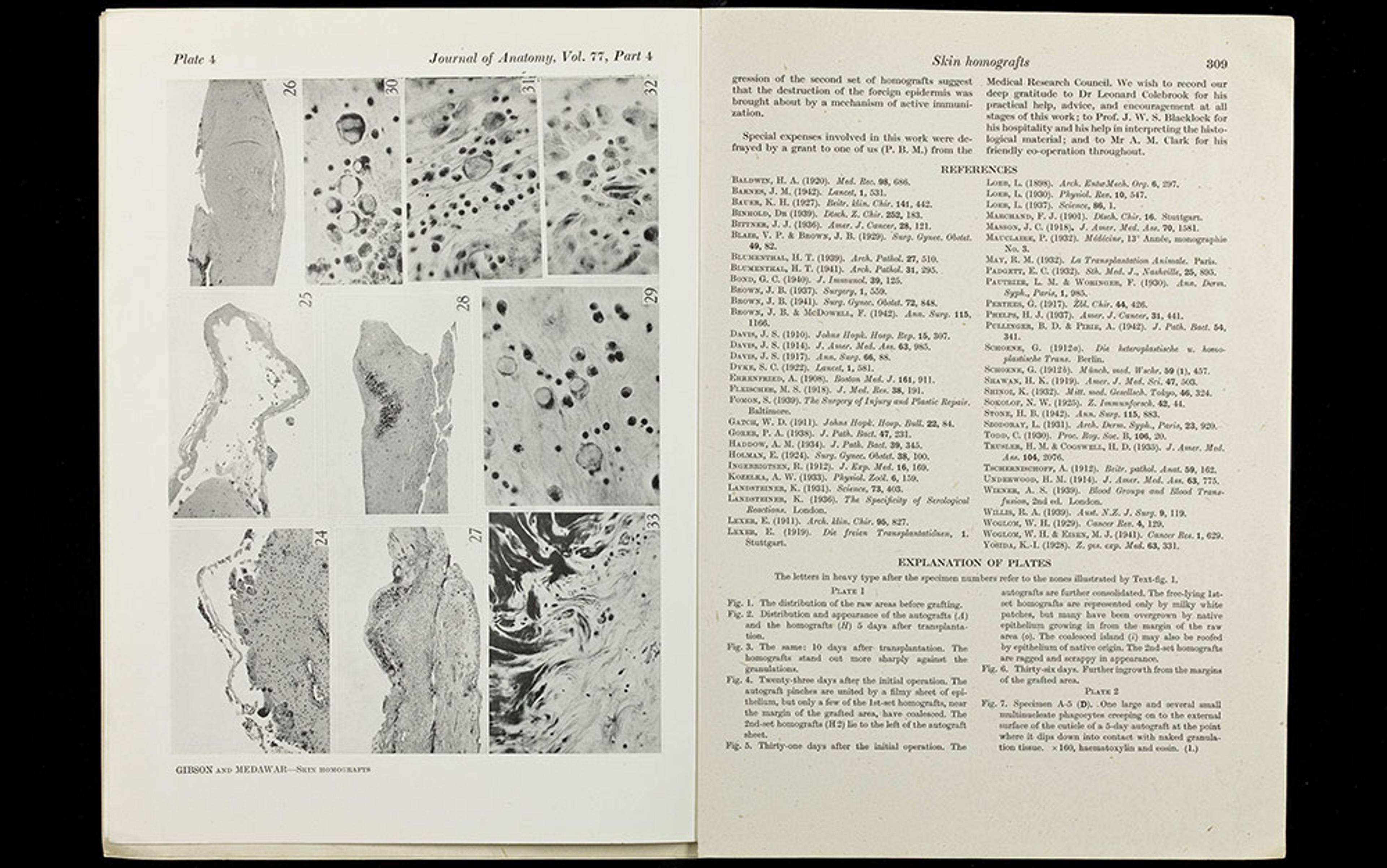
Microscopic slides showing the development of grafted tissue, from an early paper by Peter Medawar. Courtesy the Wellcome Library
The Popperian get-out clause was deployed in that most controversial of 20th-century sciences, eugenics. Medawar didn’t hesitate to deploy the supposed moral non-accountability of science in defending eugenics, the topic that furnished the basis of his BBC lectures and much that followed. His argument was a subtle one, separating the science of eugenics into two types. ‘Positive’ eugenics – the creation of a perfect race – he characterised as bad because it was (a) Nazi, and (b) an unfalsifiable scientific goal – un-Popperian on two counts. This left the field clear for Medawar to lend his support to ‘negative’ eugenics, the deliberate prevention of conception by carriers of certain genetic conditions. This, claimed Medawar, was a strictly scientific (that is, Popperian) question, and didn’t touch upon matters of ethics. It was something of an invidious argument.
With Popperian impatience over so-called mere semantics, Medawar brushed away worries that the eugenic word ‘fitness’ implied a judgment about who was ‘fit’ or not to be a part of society. Rather, Medawar claimed, it was a mere tag of convenience for an idea that had perfect clarity among evolutionary biologists. Ordinary people shouldn’t worry themselves about its implications; the important thing was that scientists had it straight in their minds. Science merely provided the facts; it was for the potential parent to decide. On one level, this sounds innocuous – and Medawar was by no means a bad person. But it was, and remains, intellectually shortsighted to disconnect science and ethics in this way. To suppose a situation in which a potential parent will exercise a perfect and unencumbered liberal choice lends unwarranted impartiality to the scientific facts. In reality, economics or politics might force that parent’s hand. A more extreme example makes the case clear: if a scientist explains nuclear technology to a bellicose despot, but leaves the ethical choice of deployment to the despot, we wouldn’t say that the scientist had acted responsibly.
As he prepared his lectures on the ‘future of man’, Medawar speculated that biological ‘fitness’ was in fact best understood as an economic phenomenon:
[I]t is, in effect, a system of pricing the endowment of organisms in the currency of offspring: ie, in terms of net reproductive performance.
Making such a connection – between the hidden hand of nature and the apparently impartial decisions of the market – was a hot way to read Popper. His greatest fans outside the scientific community were, in fact, economists. At the London School of Economics, Popper was close to the neoliberal theorist Friedrich Hayek. He also taught the soon-to-be billionaire George Soros, who named his Open Society Foundations (formerly, the Open Society Institute) after Popper’s most famous book. Along with Hayek and several others, Popper founded the Mont Pelerin Society, promoting marketisation and privatisation around the world.
Popper’s appointment to a fellowship at the Royal Society marked the demise of a powerful strand of socialist leadership in British science that had begun in the 1930s with the cadre of talented and public-facing researchers (J D Bernal, J B S Haldane and others) whom the historian Gary Werskey in 1978 dubbed ‘the visible college’. Indeed, Popper had encountered many of them during his prewar visits to the Theoretical Biology Club. While they were sharpening their complex science against the edge of Popper’s philosophy, he might well have been whetting his anti-Marxist inclinations against their socialised vision of science – even, perhaps, their personalities. What Popper did in The Open Society was take the biologists’ politicising of science and attach it to antifascism. Science and politics were connected, but not in the way that the socialists claimed. Rather, science was a special example of the general liberal virtues that can be cultivated only in the absence of tyranny.
After the war, the commitment of visible-college scientists to nation-building saw them involved in many areas of governmental, educational and public life. The Popperians hated them. In The Road to Serfdom (1944), Hayek warned that they were ‘totalitarians in our midst’, plotting to create a Marxist regime. They should leave well alone, he argued, and accept that their lab work bore no connection to social questions. Hayek’s bracketing off of governance was no more plausible in science than it was in economics. The greatest myth of neoliberalism is that it represents a neutral political perspective – a commitment to non-meddling – when in fact it must be sustained through aggressive pro-business propaganda and the suppression of organised labour. So, while Soros’s social activism has done much good in the world, it has been funded through economic activity that depends upon a systematic repression of debate and of human beings for its success. Having a philosophical cover-story for this kind of neoliberalism, that likens it to (Popperian) science, does it no harm at all.
In thinking and writing about Popper, one becomes very conscious of antisemitism. Popper fled Nazi hatred in 1930s Austria; today, Soros is the victim of antisemitic slurs that would be ridiculous were it not for the history and the real threat of continued violence in which they are rooted. We do well to remember the biographical reasons that Popper had for advancing an open society, and for trying to redeem science from the sins committed by Nazi researchers. The sly elision of fascist and socialist science as the opponent to Popperianism – sometimes deliberate, sometimes unconscious – is a move for which it’s more difficult to find sympathy.
It doesn’t take much time online to find examples of Popperianism wielded by climate change deniers
Science is profoundly altered when considered analogous to the open market. The notion that scientific theories vie with one another in open competition overlooks the fact that research ambitions and funding choices are shaped by both big-p and small-p politics. There is a reason why more scientific progress has been made in drugs for the treatment of diseases of wealth than of poverty. Moreover, career success in science – which shapes future research agendas when a person becomes a leader in their field – is a matter profoundly inflected by gender, race, class and dis/ability.
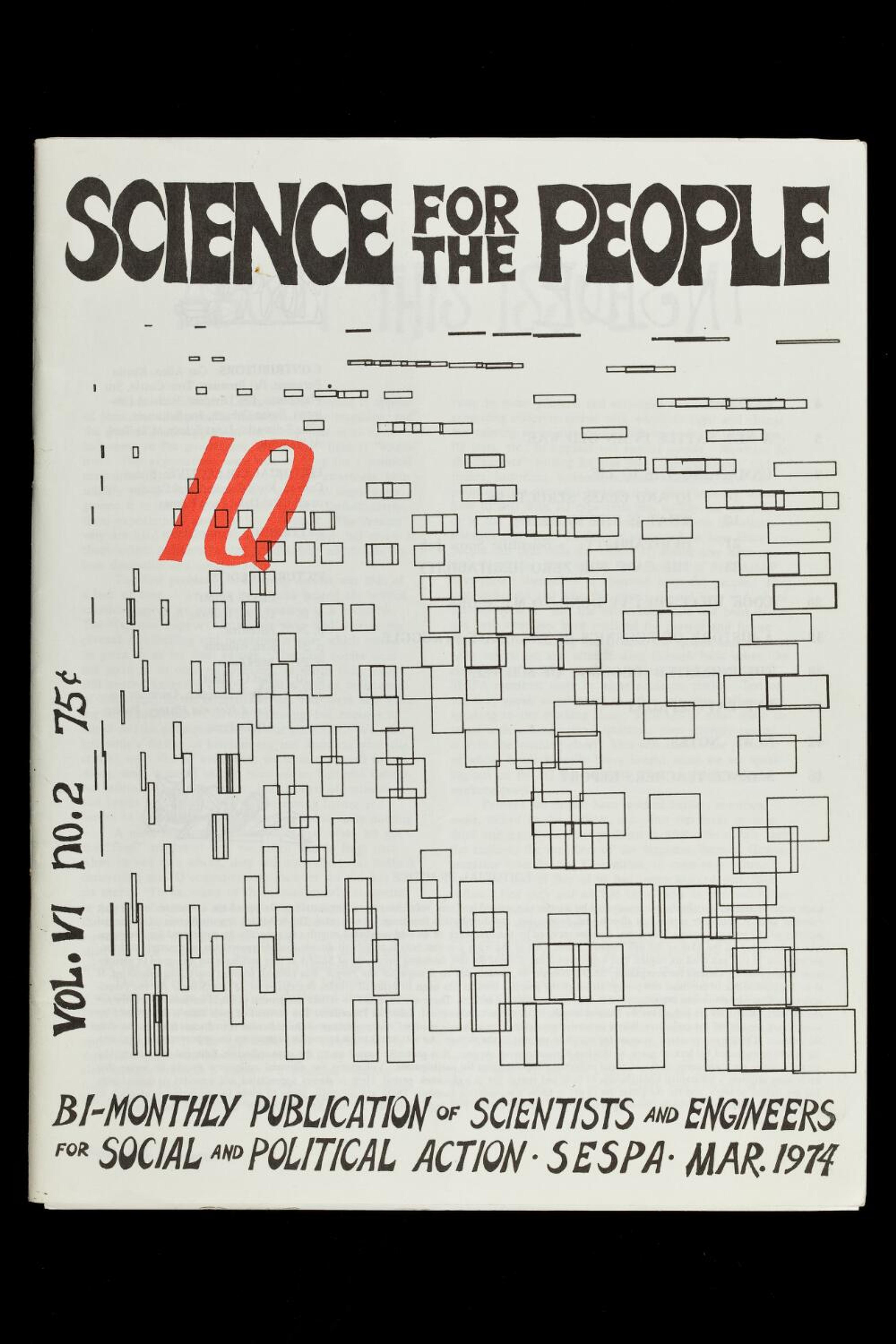
Scientists refused Popper’s distinction between science and ethics in Science for the People (this issue from 1974). Courtesy the Wellcome Library
Some unscrupulous researchers even used a Popperian frame to become, precisely, the ‘wicked scientists’ whose existence Medawar denied. As the historians Naomi Oreskes and Erik Conway describe in Merchants of Doubt (2010), scientists in the US and the UK were co-opted as lobbyists for tobacco companies during the late-20th century to cast doubt upon research that revealed a link between smoking and cancer. No such link could be proved, in Popperian terms; and that room for doubt was ruthlessly exploited by the scientists’ paymasters. Many of the same scientists went on to work for fossil fuel lobbyists, casting doubt on the science of anthropogenic climate change. It doesn’t take much time on a search engine to find examples of Popperianism wielded by deniers. In a YouTube video from 2019, the Clear Energy Alliance (which DeSmog Blog lists as funded by oil interests) called upon the ‘legendary scientific philosopher Karl Popper’. The group’s central claim is that: ‘In order to know if a theory could be true, there must be a way to prove it to be false. Unfortunately, many climate change scientists, the media and activists are ignoring this cornerstone of science.’ At the same time, academics at recognised universities write scholarly sounding papers for the libertarian, neoliberal and sceptic Cato Institute arguing that ‘Popper’s evolutionary epistemology captures … the essence of science, but the conduct of climate science today is a far cry from [it]’. Such writers typically hail from the fields of economics and policy rather than science; untroubled by the critique of scientists, Popper’s contested and outdated account of science suits them perfectly.
While Hayek et al held the smoking gun of Popperian mischief, there were well-intentioned reasons for sticking with a simple model of sceptical science. Not least that it dovetailed with the meritocratic narrative of postwar science: the notion that science, more than any other discipline, suited the upwardly mobile working and middle classes. It takes a particular kind of education and upbringing to see the aesthetics of completion, or grasp the mathematics of proof, but any smart kid can poke holes in something. If that’s what science is, then it’s open to anyone, no matter their social class. This was the meritocratic dream of educationalists in the 1950s: Britain would, in mutually supportive vein, be culturally modern and intellectually scientific.
That dream backfired. The notion that science is all about falsification has done incalculable damage not just to science but to human wellbeing. It has normalised distrust as the default condition for knowledge-making, while setting an unreachable and unrealistic standard for the scientific enterprise. Climate sceptics demand precise predictions of an impossible kind, yet seize upon a single anomalous piece of data to claim to have disproved the entire edifice of combined research; anti-vaxxers exploit the impossibility of any ultimate proof of safety to fuel their destructive activism. In this sense, Popperianism has a great deal to answer for.





